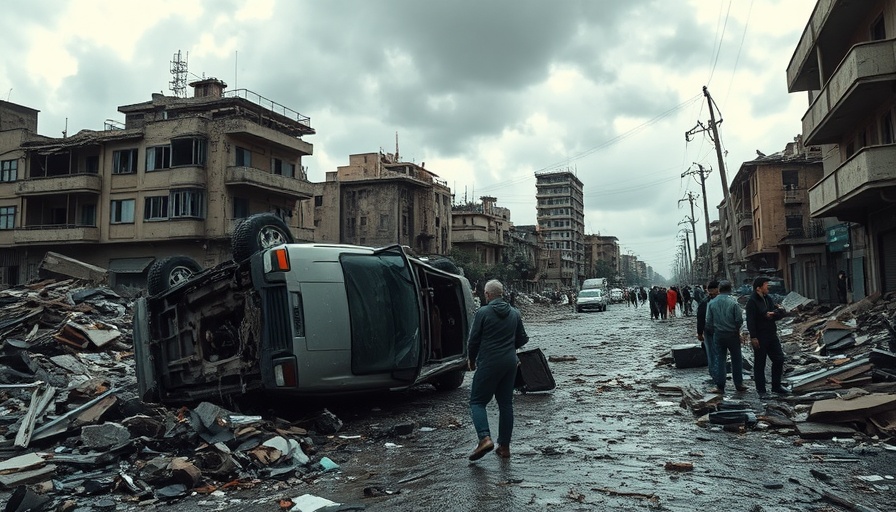
Understanding the Legacy of Hurricane Katrina
Twenty years post-Hurricane Katrina, the reverberations of this devastating event continue to shape the landscape of property insurance, particularly for vehicle owners affected by related disasters. For millions, navigating property damage claims due to similar catastrophes remains an intricate task, amplified by changing climate conditions and evolving insurance models.
How Hurricane Katrina Redefined Insurance Strategies
Katrina was a wake-up call across the insurance sector. It revealed glaring weaknesses in risk assessment models and exposure data quality, prompting insurers to leverage a wealth of better data today. Now, advanced simulations and modeling technologies synthesize high-resolution imaging to produce a more accurate picture of potential losses. This ensures that not just homes, but also assets like vehicles whose damage may be exacerbated during storms, are properly accounted for in insurance policy structures.
Risks of Future Hurricanes: Are We Prepared?
As climate change elevates risk, accurately assessing damage is paramount. Even slight inaccuracies in how damages are modeled can lead to significant headaches for those navigating the insurance claim process following property damage from severe storms. Mark Bove, a meteorologist with Munich Re, warns that the Gulf’s rising temperatures will increase the severity of future hurricanes, compounding the potential losses for insurers and policyholders alike. The onus remains on the property owners to understand their insurance coverage and ensure they are prepared for what lies ahead.
Lessons Learned: The Importance of Accurate Data
Many vehicle owners who have faced damages can appreciate the value of accurate data during a claims process. Incorrectly estimated values, based on outdated or inadequate assessments, can lead to claims that are insufficient or even denied. Karen Clark, a notable figure in the insurance modeling field, emphasizes that since Katrina, the focus has shifted to enhancing data quality, particularly for commercial properties. However, aligning accurate assessments with insurance reality remains a crucial challenge for policyholders who might find themselves under-compensated in a claim situation.
Key Takeaways for Vehicle Owners and Property Damage Claims
Understanding the nuances of your policy is essential. Whether you’re filing a claim for a vehicle damaged in a hurricane or other disasters, consider the following:
- Know Your Coverage: Familiarize yourself with your policy’s terms. Understand what kinds of damages are covered, including those stemming from environmental occurrences like flooding or storm damage.
- Document Everything: After an incident, document all damages meticulously. This resource will come in handy during negotiations with the insurance adjuster.
- Data Integrity Matters: If you suspect your property values have been undervalued, be proactive in discussing this with your insurer. Request updates to ensure fair compensation based on current market conditions.
- Dispute Denials Wisely: In the unfortunate event of a denied insurance claim, don’t hesitate to push back. Often, claims are denied based on technicalities that you may be able to counter effectively.
The Importance of Staying Informed
As hurricane seasons evolve and more intense storms become the norm, being informed about your rights and the claims process is crucial. Insurance settlement outcomes can significantly impact your recovery after property damage from severe weather. Navigating this landscape effectively often lies in your grasp — arm yourself with knowledge about how to file a claim, understand the claims timeline, and leverage claim negotiation tips to your advantage.
For vehicle owners facing property damage from environmental disasters, knowledge and preparation are now key. Knowing how to file a claim correctly, understanding the variables at play during an insurance claim process, and being prepared to advocate for your rightful compensation will greatly enhance the odds of a successful outcome.
Reflecting on the lessons learned from Hurricane Katrina, it’s imperative that you stay proactive. The changes in policy language, mitigation efforts, and enhanced models mean a more robust response from insurers—but only if you engage with them effectively. By viewing your insurance coverage as a partnership, rather than a transaction, you can navigate the complex waters of property damage claims with greater confidence.
 Add Row
Add Row  Add
Add 




Write A Comment